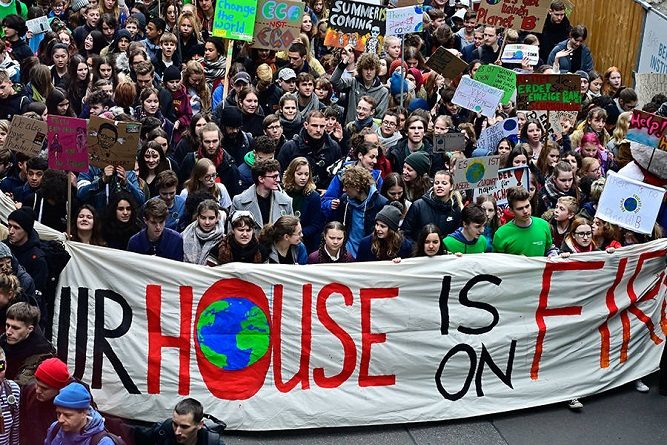CSOs slam G7 on lack of climate leadership, backsliding on promises
The G7 on Saturday May 20, 2023 released their statement from the Leaders Summit in Hiroshima. Civil society groups have reacted strongly against the groups failure to address the climate emergency, with their weak commitments, riddled with loopholes, that will enable more fossil fuel expansion while breaking previous promises. This is an unacceptable disregard to the growing warnings from scientists worldwide and the demand from people to politicians take rapid action to end fossil fuel use and scale up renewables to prevent worsening the climate crisis.
Reactions from civil society: “The G7, among the richest nations in the world, have once proven their lack of climate leadership with their statement from the Hiroshima Summit. Paying lip service to the need to keep global warming below 1.5C while at the same time continuing to invest in gas shows a bizarre political disconnect from science and a complete disregard of the climate emergency.
“Such hypocrisy from historical polluters as climate impacts continue to increase sets a low bar and jeopardises global efforts to fight the crisis. The G7 countries must come to COP28 with a clear focus on doing their fair share on phasing out fossil fuels and delivering climate finance.” – Harjeet Singh, Head of Global Political Strategy, Climate Action Network International.
“Too little too late is an understatement. The G7, representing about half of global economic wealth, has failed once again as a collective to comply with its historic and present day responsibilities to tackle the climate crisis. This statement from Hiroshima shows no plan or commitment to phase out fossil fuels well before 2050, has weak announcements on renewables and energy efficiency for this decade and lacks stronger pledges on finance to developing nations.” – Dr Stephan Singer, Senior Adviser, Climate Action Network International
“A month ago G7 ministers successfully pushed back against a Japan-led push for gas investments and fossil fuels. But Germany joining Japan in promoting gas investments means we now have a disastrous G7 Summit outcome. The repeated call for public gas investments directly contradicts the G7 Leaders’ claim that they have fulfilled their commitment to end public finance for fossil fuels by the end of last year. It also jeopardizes 1.5°C and energy security goals. The G7 today missed an important opportunity to get on track for 1.5°C to set the stage for a successful G20 and COP28 – rather they have moved in the opposite direction. They need to urgently reroute to protect people and the planet.”- Laurie van der Burg, Co-Manager Global Public Finance, Oil Change International
“Just as there is no chance of solving the nuclear threat without the active support of the G7, there is no chance of solving the climate threat without the G7 committing to ending fossil fuels proliferation. Rather than promoting outdated and devastating oil, gas and coal projects, G7 countries must invest in economic diversification away from fossil fuel production and provide their fair share of financial support to the least responsible and most affected countries. Some of their Global South counterparts, particularly a bloc of six Pacific countries, are already building a peaceful world free from fossil fuels. It is urgent that the G7 is the next bloc to support the global call for a Fossil Fuel Non-Proliferation Treaty.” – Alex Rafalowicz, Director of the Fossil Fuel Non-Proliferation Treaty initiative
“G7 leaders have ignored warnings of the Intergovernmental Panel on Climate Change: act now or it will be too late for 1.5°C. Faced with the urgent need to phase out fossil fuels, what leaders have brought to the table represents an endorsement of new fossil gas. The gap between G7 ambition and what climate science demands is stark and widening. When G7 leaders refuse to shift gear, they doom current and future generations to sink deeper in a climate crisis. Time is running out.
“G7 leaders’ endorsement of new fossil gas is a blunt denial of the climate emergency. One of the biggest fossil fuel threats today is coming from a rapidly expanding liquified natural gas (LNG) industry. Fossil gas is one of the most polluting forms of energy and in its liquefied form, its carbon emissions can be as bad as coal.” – Tracy Carty, Global Climate Politics Expert, Greenpeace International
“The leaders of G7 have agreed to climate targets with too many loopholes. Instead of ruling out new investments in gas, G7 leaders left the door open for anachronistic fossil fuel infrastructure. The German chancellor Olaf Scholz has regrettably pushed through a weaker language than his climate minister Habeck did in the recent G7 climate and energy ministerial.”
“The G7 leaders’ communiqué shows a serious disconnect with science, as it enables new investment in fossil gas infrastructure, despite the very clear messages from both the International Energy Agency, IEA, and IPCC, which show that a future below 1.5 degrees can’t include more fossil fuels. Most likely, the German chancellor Olaf Scholz has been a driving force behind the weak language on gas, which is a serious blow to Germany’s international credibility on climate.”
“German Chancellor Scholz stated just a few weeks ago that he wanted to build on last year’s commitment of decarbonising the power sector by 2035, but still this year’s communiqué doesn’t make that commitment without loopholes.” – Petter Lydén, Head of International Climate Policy, Germanwatch
‘The G7 owes the Global South $8.7 trillion for the devastating losses and damages their excessive carbon emissions have caused. In the G7 Hiroshima communique they said they recognised that there is a new Loss and Damage fund, but they failed to commit a single cent.’
‘It is good they continue to recognise the need to meet 1.5 degrees, and stay committed to this despite the energy crisis driven by the war in Ukraine, but they try to blame everyone else- they are far off track themselves to contribute their fair share of what is needed to meet this target and they should have been on track years ago.
‘They confirm their commitment to end public funding for fossil energy, they maintain their loophole on new fossil gas, using the war as an excuse. This means they have continued to wriggle out of their commitment to not publicly fund new fossil fuels, making a mockery of their fine statements. The G7 must stop using fossil fuels immediately – the planet is on fire.” – Max Lawson, Head of Inequality Policy, Oxfam
“The message from G7 leaders falls short in addressing their carbon addiction. The G7s Clean Energy Action Plan lacks specifics and failed to build on the concrete targets of the G7 Energy and Environment Ministers. The tepid commitment from G7 leaders to accelerate the phase out of fossil fuels and decarbonize the power sector by 2035 are simply not serious enough attempts given the loopholes in it such as the irresponsible promotion of gas investments.” -Andreas Sieber, 350.org Associate Director for Global Policy
“This year’s G7 is revealing Japan’s failure of climate leadership at a global level. At a time when we rapidly need to phase out fossil fuels, this year’s G7 host has pushed for the expansion of gas and LNG and technologies that would prolong the use of coal. Activists mobilized 50 actions across 22 countries this week to demand that Japan end its fossil fuel finance and stop driving the expansion of gas and other fossil-based technologies. Japan will continue to face intense international scrutiny until it stops fueling the climate crisis.” – Susanne Wong, Asia Program Manager, Oil Change International




